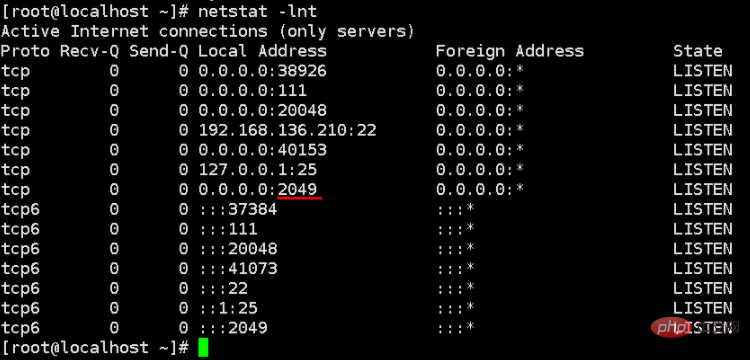What does linux nfs mean?
In Linux, nfs refers to "network file system", which is a file system that allows users to access the server; it can mount remote disks locally and use them as local disks. Through NFS, users and programs can access files in remote systems just like local files; NFS uses a C/S architecture, and the server needs to open TCP2049 port.

#The operating environment of this tutorial: linux5.9.8 system, Dell G3 computer.
1. Introduction to NFS
NFS is Network File System (network file system), which is a file system that allows users to access the server. The main function is to allow files or directories to be shared between different servers through the network.
NFS is a technology that can mount a remote disk to a local disk and use it as a local disk. Through NFS, users and programs can access files on the remote system as if they were local files.
NFS adopts C/S architecture. The server opens TCP2049 port and waits for client connection.
2. NFS installation and startup
During NFS installation, since NFS is based on rpcbind, when installing NFS, you need to install rpcbind first. The NFS service installation command is :
yum install -y rpcbind nfs-utils
Similarly, when starting, rpcbind is started first, and then NFS is started. The relevant commands are as follows:
systemctl start rpcbind systemctl start nfs-utils
After the NFS service is started, it will listen to the local 2049 port, as shown below:

3. Practical use of NFS
To set up NFS, you first need to configure the client that is allowed to be mounted on the server. For IP address and permissions, you need to open the /etc/exports file and write in the file:
/nfs 192.168.136.101(rw)
Among them, /nfs in the front indicates the directory that is allowed to be mounted, and 192.168.136.101 in the back indicates the clients that are allowed to be mounted. terminal, you can also use * to indicate that any host is allowed to be mounted, and rw indicates that the mounting permission is read and write permissions.
In addition to rw permissions, other commonly used permissions are:
1. ro - indicates read-only permission
2. sync - indicates that data is written to the memory and disk synchronously
3. async ——Indicates that the data is stored in the memory first, rather than written directly to the disk
4. secure——Indicates that NFS uses ports below 1024 when transferring files
5. insecure——Indicates that NFS uses ports when transferring files Ports above 1024
6. all_squash——Indicates that the UID and GID of the file are anonymous, suitable for shared directory configuration
7. no_all_suash——Indicates that the UID and GID of the file are retained
After completing the above operations, you need Execute the command:
exportfs -rv
to re-read the NFS configuration file.
Next, on the client, execute the mount command:
showmount -e 192.168.136.210mount 192.168.136.210/nfs /media
to successfully mount the file. After the mount is successful, execute the command df -h to view the mount result, as shown below:

Note: Before performing the mounting operation, the server's firewall must be turned off! Otherwise the mount will fail.
However, although it can be mounted successfully and has read and write permissions on the service configuration, in actual operation, the client may not have write permissions on the mounted directory. This is because the service configuration There is also a problem of permission checking in the end system. Since the NFS service is run by user nfsnobody by default, and if the user does not have write permissions on the /nfs directory, the client cannot write to the directory. Therefore, we need to grant the nfsnobody user write permissions, such as :
chonw nfsnobody.nfsnobody -R /nfs
In this way, we can use the NFS file system like a local mount.
4. NFS mount optimization
In the above actual combat, although we can mount NFS and achieve the expected effect, in actual combat scenarios , in order to improve the read and write speed of NFS, we will not use the following mount command:
mount -t nfs -o noatime,nodiratime,rsize=131072,wsize=131072,intr 192.168.126.210:/nfs /media
In the above command, the -t parameter indicates that the target file system to be mounted is nfs, and noatime indicates to cancel the update of the file system. The inode access time on the file system, nodirtime means canceling the update of the directory inode access time on the file system. These two options can be used in high concurrency environments to improve system performance. rsize and wsizei represent the size of the read and written blocks. This setting value UID affects the amount of buffer storage for written data by the client and server. When the device performance is high, this value can be set larger to improve the file transfer capability of the NFS system.
Related recommendations: "Linux Video Tutorial"
The above is the detailed content of What does linux nfs mean?. For more information, please follow other related articles on the PHP Chinese website!

Hot AI Tools

Undresser.AI Undress
AI-powered app for creating realistic nude photos

AI Clothes Remover
Online AI tool for removing clothes from photos.

Undress AI Tool
Undress images for free

Clothoff.io
AI clothes remover

Video Face Swap
Swap faces in any video effortlessly with our completely free AI face swap tool!

Hot Article

Hot Tools

Notepad++7.3.1
Easy-to-use and free code editor

SublimeText3 Chinese version
Chinese version, very easy to use

Zend Studio 13.0.1
Powerful PHP integrated development environment

Dreamweaver CS6
Visual web development tools

SublimeText3 Mac version
God-level code editing software (SublimeText3)

Hot Topics
 1666
1666
 14
14
 1425
1425
 52
52
 1327
1327
 25
25
 1273
1273
 29
29
 1252
1252
 24
24
 Linux Architecture: Unveiling the 5 Basic Components
Apr 20, 2025 am 12:04 AM
Linux Architecture: Unveiling the 5 Basic Components
Apr 20, 2025 am 12:04 AM
The five basic components of the Linux system are: 1. Kernel, 2. System library, 3. System utilities, 4. Graphical user interface, 5. Applications. The kernel manages hardware resources, the system library provides precompiled functions, system utilities are used for system management, the GUI provides visual interaction, and applications use these components to implement functions.
 vscode Previous Next Shortcut Key
Apr 15, 2025 pm 10:51 PM
vscode Previous Next Shortcut Key
Apr 15, 2025 pm 10:51 PM
VS Code One-step/Next step shortcut key usage: One-step (backward): Windows/Linux: Ctrl ←; macOS: Cmd ←Next step (forward): Windows/Linux: Ctrl →; macOS: Cmd →
 How to check the warehouse address of git
Apr 17, 2025 pm 01:54 PM
How to check the warehouse address of git
Apr 17, 2025 pm 01:54 PM
To view the Git repository address, perform the following steps: 1. Open the command line and navigate to the repository directory; 2. Run the "git remote -v" command; 3. View the repository name in the output and its corresponding address.
 How to run java code in notepad
Apr 16, 2025 pm 07:39 PM
How to run java code in notepad
Apr 16, 2025 pm 07:39 PM
Although Notepad cannot run Java code directly, it can be achieved by using other tools: using the command line compiler (javac) to generate a bytecode file (filename.class). Use the Java interpreter (java) to interpret bytecode, execute the code, and output the result.
 How to run sublime after writing the code
Apr 16, 2025 am 08:51 AM
How to run sublime after writing the code
Apr 16, 2025 am 08:51 AM
There are six ways to run code in Sublime: through hotkeys, menus, build systems, command lines, set default build systems, and custom build commands, and run individual files/projects by right-clicking on projects/files. The build system availability depends on the installation of Sublime Text.
 What is the main purpose of Linux?
Apr 16, 2025 am 12:19 AM
What is the main purpose of Linux?
Apr 16, 2025 am 12:19 AM
The main uses of Linux include: 1. Server operating system, 2. Embedded system, 3. Desktop operating system, 4. Development and testing environment. Linux excels in these areas, providing stability, security and efficient development tools.
 laravel installation code
Apr 18, 2025 pm 12:30 PM
laravel installation code
Apr 18, 2025 pm 12:30 PM
To install Laravel, follow these steps in sequence: Install Composer (for macOS/Linux and Windows) Install Laravel Installer Create a new project Start Service Access Application (URL: http://127.0.0.1:8000) Set up the database connection (if required)
 git software installation
Apr 17, 2025 am 11:57 AM
git software installation
Apr 17, 2025 am 11:57 AM
Installing Git software includes the following steps: Download the installation package and run the installation package to verify the installation configuration Git installation Git Bash (Windows only)




